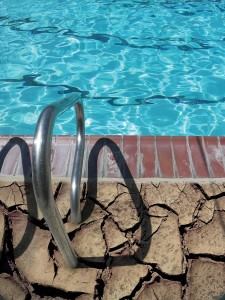More cities are considering water restrictions after California’s governor declared that urban water use must be cut by 25 percent across the state. Recently, Beverly Hills announced a City Council resolution to ban the draining and refilling of pools and enact a $1,000 fine for violators. It was expected to essentially be rubber stamped at a May 5 meeting, however the measure was put on hold while staff tend to some housekeeping matters involved in managing water restrictions in general, such as establishing an appeals process. As the city figures these things out, the proposal to ban fills and refills remains on the table. It may do the same for new-pool filling at some point.
This comes after the State Water Resources Control Board assigned each city a water-conservation goal. Steeper reductions are required of cities that use more water per capita. “[Beverly Hills is] being asked to cut by 36 percent, so we have to take fairly drastic measures to meet that requirement,” said Beverly Hills spokesperson Therese Kosterman.
Claremont, a city approximately 30 miles outside Los Angeles, has banned filling or refilling of pools, new or existing. Permits will be issued if city water isn’t used to fill the vessel.
The Santa Barbara industry saw better luck when the city council there voted against a staff recommendation to ban permits for new pools, as well as filling and refilling existing installations.
A few cities with the lowest water levels, such as Montecito, near Santa Barbara, have had restrictions in place for a while.
A key to success in Santa Barbara seemed to be the appearance of four industry representatives who commented at the city council meeting. Additionally, CPSA furnished materials in advance of the meeting. Conversely, Claremont local professionals were unaware that local officials were considering restrictions. Once bans are put in place, they are difficult to reverse, Norwood said.
Participation by industry professionals has been vital to the effort so far. To avoid being caught offguard, CPSA recommends that professionals monitor all meeting agendas for their local city councils and water districts to gain a heads-up, then notify CPSA. The association provides speaker kits to help professionals address city governments and water districts, and it sometimes sends a CPSA representative to comment.
You can also follow these tips for working with local government.
The State Water Resources Control Board is contemplating further action. To address this, Keith Harbeck of Premier Pools in Rancho Cordova, Calif. spoke to the agency on behalf of the California Pool & Spa Association. Industry officials sought to convince the agency to include language stating that the regulations are not intended to block economic activity, said John Norwood, CPSA’s president and chief lobbyist. This could help professionals face local water districts that are considering restrictions, he said.
CPSA has set a fundraising goal of $100,000 in new memberships, then another $100,000 to supplement the organization’s drought fund. It is about halfway there.



